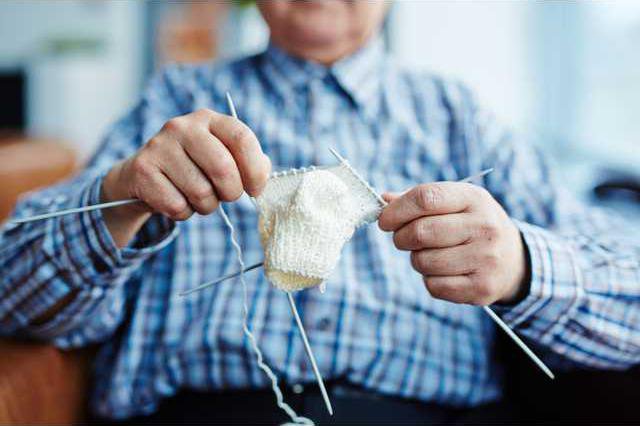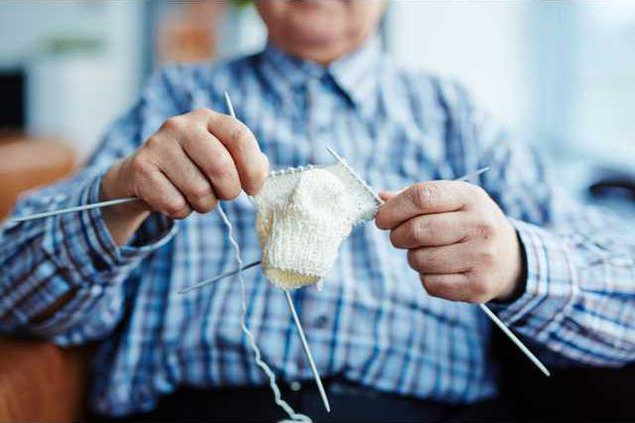ACWORTH, Ga. Not only can you teach an old dog new tricks, but that dog might just become the master.
When 86-year-old Ed Moseley learned his assisted-living home was participating in a project that involved knitting tiny caps for premature babies in the NICU, he knew he wanted to participate, according to Today. The only issue? He had no idea how to knit.
Moseley, a grandfather of five and great-grandfather to eight, turned to his daughter for help. She hooked him up with an introductory kit, needles and yarn.
I mean, I can read, and I can follow directions, Moseley told Today. There was a little trial and error there at the beginning, but eventually I got the hang of it.
Moseley got to work, and once he caught on, he caught fire. Part of his motivation in learning the new craft was to present the families of the sick babies with something truly meaningful.
Its really nice to make a product that somebody really needs and has a purpose, he said.
Each time he finished a cap, Moseley would lay it out on his big, red couch. A good idea in theory, until he found himself without a place to sit. In all, Moseley knitted a whopping 55 hats for the hospital, inspiring his care manager and a local high school student to join in his effort.
Earlier this month, Moseley walked into the Northside Hospital Atlanta armed with 300 caps.
Its amazing to think about how many lives his caps will touch, JoAn Hobbs, the director of Moseleys assisted living community, told Today. There is something special about seniors giving to preemies.
Moseleys story has caught the attention of thousands across the country, some of whom have sent skeins of yarn to help him with his project.
Moseley also fulfills custom orders and requests, something thats pretty impressive considering hes a relative newbie to the knitting biz. In fact, the hospital was so moved by his enthusiasm that hes been asked to take on a new project: knitting red hats for newborns in the cardiac wing.
Its great to receive these wonderful gifts, Northside nurse Linda Kelly told Today. Many times, our families dont expect to be introduced to the special care nursery, so to have a gift left at the bedside or a nurse put the hat on the little babys head makes it all seem less like a hospital.
When 86-year-old Ed Moseley learned his assisted-living home was participating in a project that involved knitting tiny caps for premature babies in the NICU, he knew he wanted to participate, according to Today. The only issue? He had no idea how to knit.
Moseley, a grandfather of five and great-grandfather to eight, turned to his daughter for help. She hooked him up with an introductory kit, needles and yarn.
I mean, I can read, and I can follow directions, Moseley told Today. There was a little trial and error there at the beginning, but eventually I got the hang of it.
Moseley got to work, and once he caught on, he caught fire. Part of his motivation in learning the new craft was to present the families of the sick babies with something truly meaningful.
Its really nice to make a product that somebody really needs and has a purpose, he said.
Each time he finished a cap, Moseley would lay it out on his big, red couch. A good idea in theory, until he found himself without a place to sit. In all, Moseley knitted a whopping 55 hats for the hospital, inspiring his care manager and a local high school student to join in his effort.
Earlier this month, Moseley walked into the Northside Hospital Atlanta armed with 300 caps.
Its amazing to think about how many lives his caps will touch, JoAn Hobbs, the director of Moseleys assisted living community, told Today. There is something special about seniors giving to preemies.
Moseleys story has caught the attention of thousands across the country, some of whom have sent skeins of yarn to help him with his project.
Moseley also fulfills custom orders and requests, something thats pretty impressive considering hes a relative newbie to the knitting biz. In fact, the hospital was so moved by his enthusiasm that hes been asked to take on a new project: knitting red hats for newborns in the cardiac wing.
Its great to receive these wonderful gifts, Northside nurse Linda Kelly told Today. Many times, our families dont expect to be introduced to the special care nursery, so to have a gift left at the bedside or a nurse put the hat on the little babys head makes it all seem less like a hospital.








